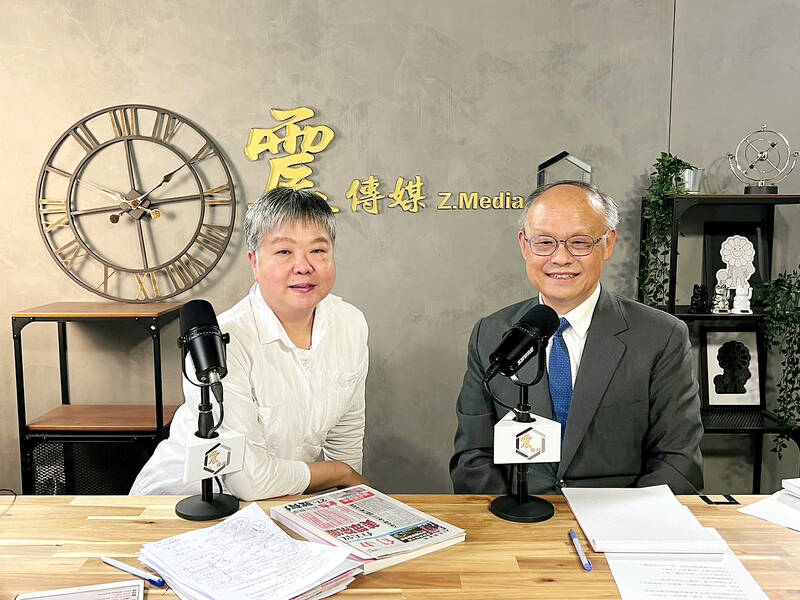The US House of Representatives on Wednesday approved the first agreement under the US-Taiwan Initiative on 21st-Century Trade, sending it to the US Senate where it is expected to be ratified.
The initiative streamlines customs checks, looks to improve regulatory procedures and establishes anti-corruption measures.
The American Institute in Taiwan signed the agreement on June 1 with the Taipei Economic and Cultural Representative Office in the US.

Photo courtesy of Z.Media
In Taipei, Minister Without Portfolio John Deng (鄧振中) said that expanding agricultural exports to the US would be a priority issue in negotiations of the second phase of the initiative.
Deng in an interview with media personality Frances Huang (黃光芹) said that environmental protection and labor issues would also be high on the agenda for negotiations in the second part of the trade initiative with the US.
The agreement covers 81 articles in five key areas and is a complete pact, Deng said, adding that it has legal basis and is a formal accord, unlike most of the deals previously signed with the US, which were in the form of memorandums.
The agreement covers the areas of customs administration and trade facilitation, good regulatory practices, services domestic regulation, anti-corruption, and small and medium-sized enterprises.
Taiwan and the US are to hold trade talks on the more complicated topics of environmental protection, labor and agricultural issues, Deng said.
On the issue of agriculture, the focus would be on Taiwan’s exports of agricultural products to the US, he said.
China used to be the largest market for Taiwanese agricultural exports.
However, Beijing has over the past few years banned the importation of several Taiwanese agricultural products, prompting the nation to shift exports to Singapore and Japan, he added.
The US is the biggest market for Taiwan’s agricultural goods and processed agricultural products, Deng said.
Regarding environmental protection, Taiwan would seek an environmental protection agreement with Washington, Deng said.
The government also hopes to create a favorable work environment for Taiwanese, he added.
The topics in the next phase of talks would be “a little more difficult” to discuss than the previous five items, Deng said.

Taiwan has received more than US$70 million in royalties as of the end of last year from developing the F-16V jet as countries worldwide purchase or upgrade to this popular model, government and military officials said on Saturday. Taiwan funded the development of the F-16V jet and ended up the sole investor as other countries withdrew from the program. Now the F-16V is increasingly popular and countries must pay Taiwan a percentage in royalties when they purchase new F-16V aircraft or upgrade older F-16 models. The next five years are expected to be the peak for these royalties, with Taiwan potentially earning

STAY IN YOUR LANE: As the US and Israel attack Iran, the ministry has warned China not to overstep by including Taiwanese citizens in its evacuation orders The Ministry of Foreign Affairs (MOFA) yesterday rebuked a statement by China’s embassy in Israel that it would evacuate Taiwanese holders of Chinese travel documents from Israel amid the latter’s escalating conflict with Iran. Tensions have risen across the Middle East in the wake of US and Israeli airstrikes on Iran beginning Saturday. China subsequently issued an evacuation notice for its citizens. In a news release, the Chinese embassy in Israel said holders of “Taiwan compatriot permits (台胞證)” issued to Taiwanese nationals by Chinese authorities for travel to China — could register for evacuation to Egypt. In Taipei, the ministry yesterday said Taiwan

Taiwan is awaiting official notification from the US regarding the status of the Agreement on Reciprocal Trade (ART) after the US Supreme Court ruled US President Donald Trump's global tariffs unconstitutional. Speaking to reporters before a legislative hearing today, Premier Cho Jung-tai (卓榮泰) said that Taiwan's negotiation team remains focused on ensuring that the bilateral trade deal remains intact despite the legal challenge to Trump's tariff policy. "The US has pledged to notify its trade partners once the subsequent administrative and legal processes are finalized, and that certainly includes Taiwan," Cho said when asked about opposition parties’ doubts that the ART was

If China chose to invade Taiwan tomorrow, it would only have to sever three undersea fiber-optic cable clusters to cause a data blackout, Jason Hsu (許毓仁), a senior fellow at the Hudson Institute and former Chinese Nationalist Party (KMT) legislator, told a US security panel yesterday. In a Taiwan contingency, cable disruption would be one of the earliest preinvasion actions and the signal that escalation had begun, he said, adding that Taiwan’s current cable repair capabilities are insufficient. The US-China Economic and Security Review Commission (USCC) yesterday held a hearing on US-China Competition Under the Sea, with Hsu speaking on